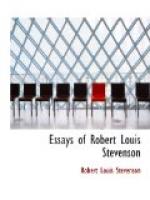VIII
BOOKS WHICH HAVE INFLUENCED ME[1]
The Editor[2] has somewhat insidiously laid a trap for his correspondents, the question put appearing at first so innocent, truly cutting so deep. It is not, indeed, until after some reconnaissance and review that the writer awakes to find himself engaged upon something in the nature of autobiography, or, perhaps worse, upon a chapter in the life of that little, beautiful brother whom we once all had, and whom we have all lost and mourned, the man we ought to have been, the man we hoped to be. But when word has been passed (even to an editor), it should, if possible, be kept; and if sometimes I am wise and say too little, and sometimes weak and say too much, the blame must lie at the door of the person who entrapped me.
The most influential books,[3] and the truest in their influence, are works of fiction. They do not pin the reader to a dogma, which he must afterwards discover to be inexact; they do not teach him a lesson, which he must afterwards unlearn. They repeat, they rearrange, they clarify the lessons of life; they disengage us from ourselves, they constrain us to the acquaintance of others; and they show us the web of experience, not as we can see it for ourselves, but with a singular change—that monstrous, consuming ego of ours being, for the nonce, struck out. To be so, they must be reasonably true to the human comedy; and any work that is so serves the turn of instruction. But the course of our education is answered best by those poems and romances where we breathe a magnanimous atmosphere of thought and meet generous and pious characters. Shakespeare has served me best. Few living friends have had upon me an influence so strong for good as Hamlet or Rosalind. The last character, already well beloved in the reading, I had the good fortune to see, I must think, in an impressionable hour, played by Mrs. Scott Siddons.[4] Nothing has ever more moved, more delighted, more refreshed me; nor has the influence quite passed away. Kent’s brief speech[5] over the dying Lear had a great effect upon my mind, and was the burthen of my reflections for long, so profoundly, so touchingly generous did it appear in sense, so overpowering in expression. Perhaps my dearest and best friend outside of Shakespeare is D’Artagnan—the elderly D’Artagnan of the Vicomte de Bragelonne.[6] I know not a more human soul, nor, in his way, a finer; I shall be very sorry for the man who is so much of a pedant in morals that he cannot learn from the Captain of Musketeers. Lastly, I must name the Pilgrim’s Progress,[7] a book that breathes of every beautiful and valuable emotion.




